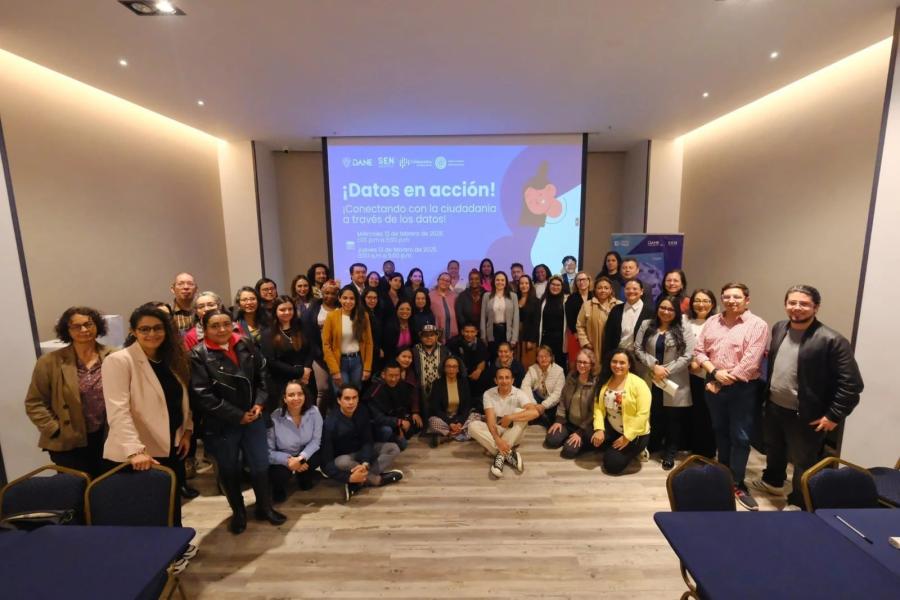
Enhancing Inclusive Data Systems and Participation in Data Production: The Collaborative on Citizen Data
Read about the commitment “Enhancing production and use of citizen data” by the Steering Committee of the Collaborative on Citizen Data here.
Citizen data, or data that is produced outside of official statistics by citizens or organizations, is a crucial yet underutilized tool to bridge gaps in data systems and empower communities to take ownership of data. To ensure that citizen data is supported, properly valued, and used to create meaningful change, the Collaborative on Citizen Data was formed as an initiative of the United Nations Statistics Division (UNSD). At the World Data Forum, the Collaborative committed to enhancing citizen data by implementing citizen data initiatives, conducting workshops on citizen data, and disseminating knowledge on best practices.

Citizen data is not merely an alternative source of data: it is a mechanism to create inclusive data systems to drive meaningful change. The Collaborative’s focus includes utilizing citizen data for marginalized groups that are often excluded or misrepresented in official statistics, such as persons with disabilities, the LGBT+ community, and indigenous peoples.
Action for Progress: What Has Been Accomplished
At the 56th Session of the UN Statistical Commission, the Copenhagen Framework for Citizen Data was endorsed, ensuring that citizen data is institutionalized and ensuring that partnerships between communities, civil society organizations, and national statistics offices (NSOs). Additionally, the Collaborative has conducted several workshops and participated in numerous events, including:

- 14 August 2025: The Collaborative organized a peer-learning exchange between colleagues in Kenya and Malawi on developing shared platforms for citizen data and strengthening partnerships between data producers and official institutions.
- 23 July 2025: The Collaborative hosted a full-day workshop “Advancing Inclusive Data Systems: Strengthening Citizen Data for Impact” with four sessions: “The Copenhagen Framework on Citizen Data and its implementation,” “Gender and Citizen Data for Transformative Action,” “Intersectional and disability data: data sources for more equitable and inclusive data systems,” and “Integration of citizen data with other data source.”
- June 1, 2025: The Collaborative participated in a panel entitled “Internet powered citizen data for inclusive public services” at the Internet Governance Forum. Discussion included how citizen data strengthens data systems, examples of inclusive data collection from Ghana’s NSO, and empowering local stakeholders from Colombia’s NSO.

- 10-13 March 2025: The Collaborative, Kyrgyzstan’s National Statistical Committee, and UNSD’s Data For Now partnered to host a 3-day workshop “Co-creating the Future: Citizen Data and Participation in Kyrgyz Republic’s 2025 Voluntary National Review.” This workshop included the creation of a roadmap to increase collaboration for citizen data in SDG monitoring.
- 3 March 2025: At the 56th UN Statistical Commission, the Collaborative hosted a side event “Partnership for Impact: NSOs and the Copenhagen Framework on Citizen Data” to discuss the importance of citizen data to building inclusive data systems and to explore ways to integrate citizen data into NSOs’ statistical systems.
- 12-13 February, 2025: The Collaborative co-hosted a workshop entitled “Data in Action: Connecting with Citizens through Data” with Colombia’s Departamento Administrativo Nacional de Estadística.
Looking Ahead: Continuing the Momentum
The Collaborative has already made significant strides in advancing knowledge on citizen data, fostering partnerships between citizen data producers and official statistical institutions, and supporting national statistical offices (NSOs) through hands-on workshops. Yet, the work is far from complete. The upcoming 4th Expert Group Meeting on Citizen Data and Workshops, to be held in Bangkok, Thailand, from 10–12 November 2025, will build on this progress. The event will feature a workshop on producing impact stories from citizen data initiatives, a session on strengthening the use of citizen data for policymaking, and in-depth discussions on implementing the Copenhagen Framework on Citizen Data—marking the next step in translating shared principles into concrete action.
